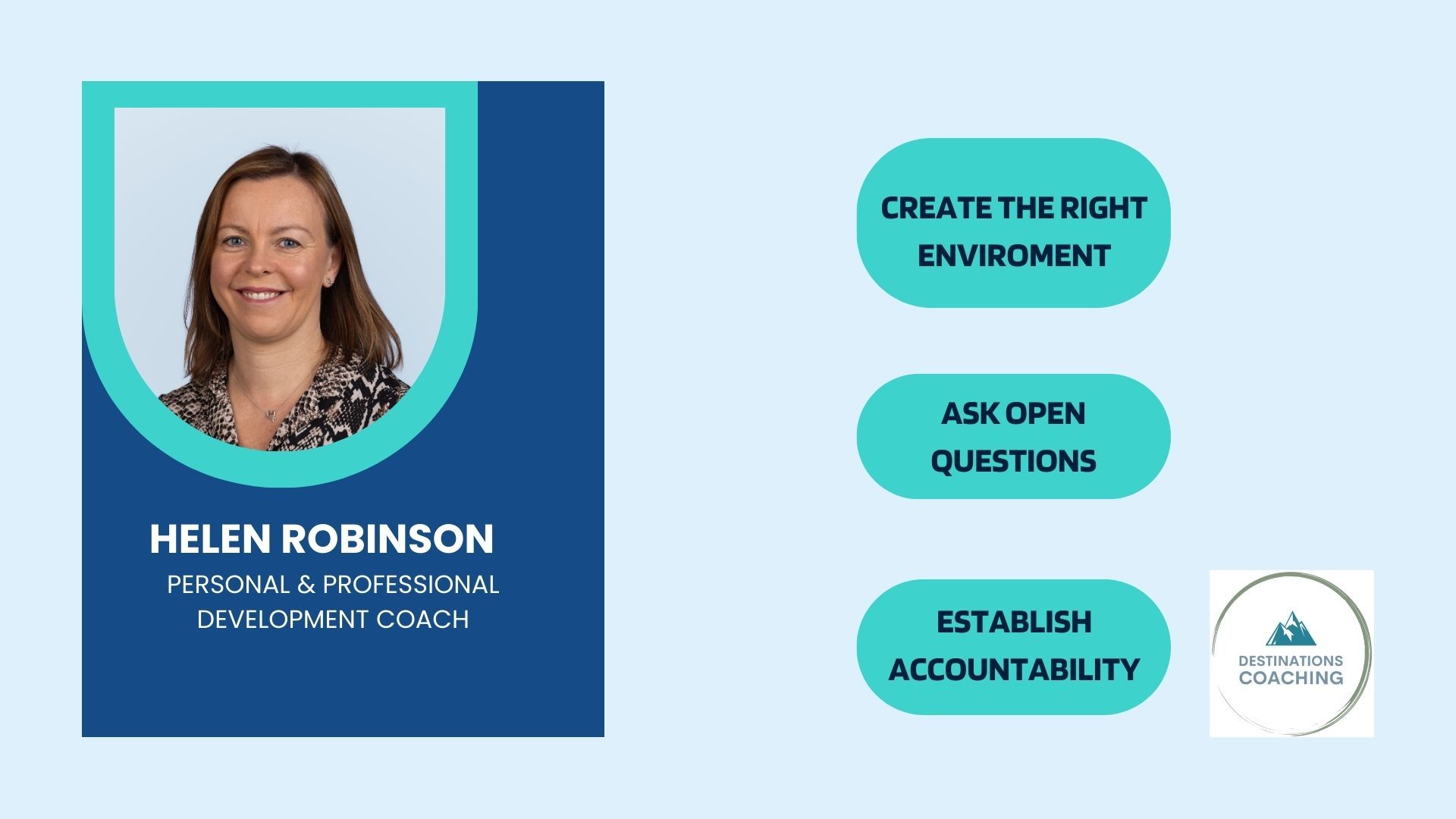Helen's blog
Helen's Blog
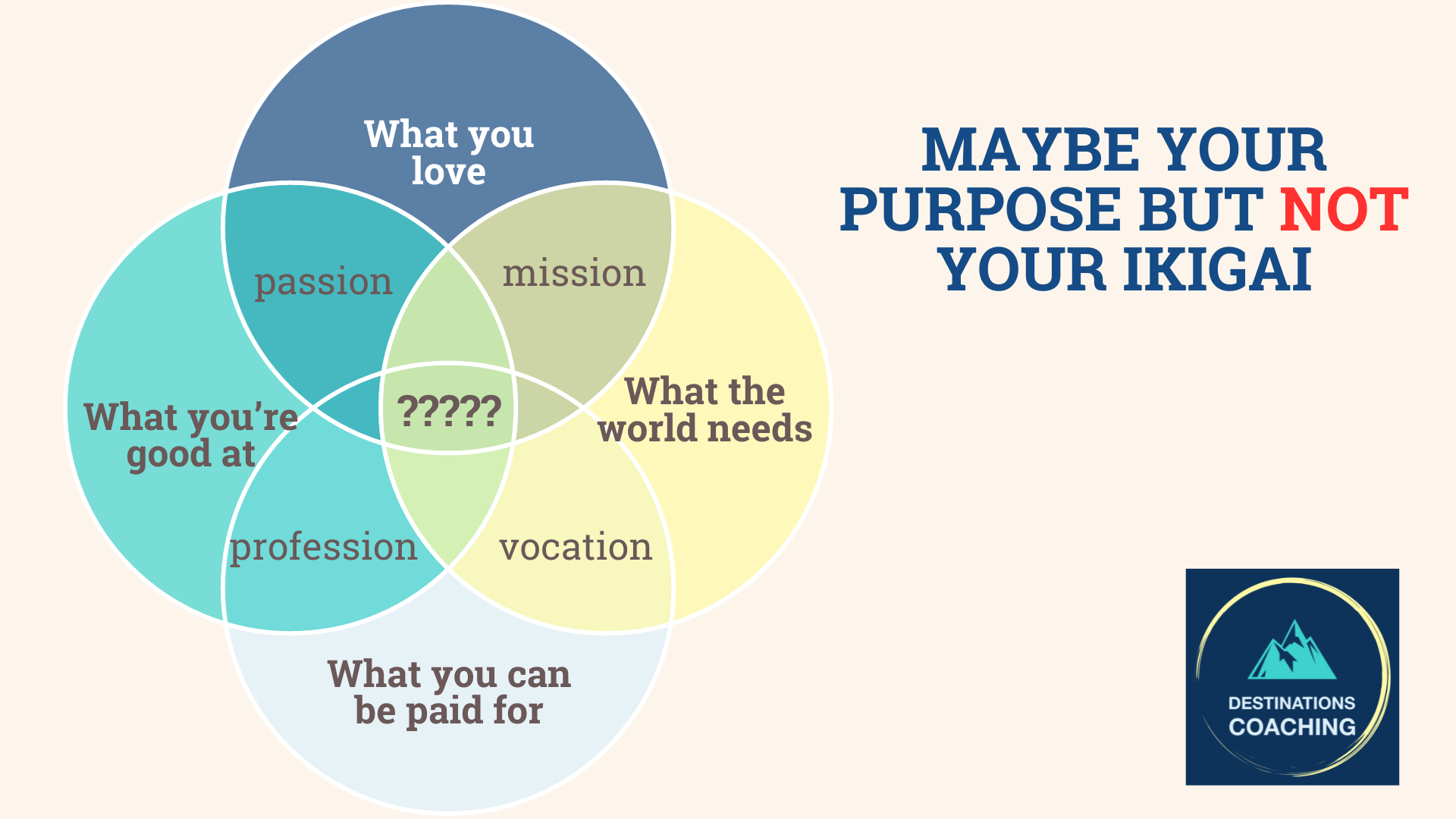
By Helen Robinson
•
08 Jan, 2024
As the UK's only ICF and Ikigai qualified and certified practicing coach, I've noticed a recurring theme among my clients as January unfolds – a month marked by questions like "what's it all about?" and "what's the point?" The anticipation of the Christmas break provided a sense of relief, but with summer holidays seeming distant, many are left feeling adrift. This year, Blue Monday falls on the 15th, later than usual, yet the "Monday blues" aren't solely experienced on a single day of the month. In the West, we often set our sights on future positive events and goals, a practice with its merits. However, this exclusive focus on the destination can lead to a loss of appreciation for the journey, missing out on the small pleasures in our daily lives. Moreover, once the initial rush of achieving a goal fades away, the return to a low emotional state can be swift. Enter Ikigai, a Japanese philosophy that you may have come across from the misconceived Western model which asks what we are good at, what we enjoy, what the world needs, and what we can be paid for. The true Japanese Ikigai concept is much deeper than this and serves as a tool to help regulate and balance the emotional highs and lows, fostering a daily experience of joy, meaning, and value. Instead of fixating on the end goal, Ikigai encourages us to find fulfilment in the journey itself. To delve deeper into this transformative concept, I invite you to join my Ikigai Webinar on January 18th. In this session, we will explore the intricacies of Ikigai and uncover where your Ikigai currently resides. More importantly, you will gain insights into simple practices that can be seamlessly integrated into your daily life, fostering a more positive outlook and helping you discover your purpose. In a world that often prioritises distant goals and grand achievements, Ikigai offers a refreshing perspective, reminding us to find contentment in the present moment. Let's navigate the path to purpose together and embrace a life filled with joy, meaning, and value, not just on special occasions but every day. Join me on January 18th, and let's embark on this journey together. https://www.eventbrite.co.uk/e/761216778877?aff=oddtdtcreator

By Helen Robinson
•
06 Nov, 2023
Ikigai is a beautiful Japanese concept that means having meaning and purpose in your daily life leading to a sense of fulfilment and life satisfaction. In the Western world, Ikigai is often misconceived as a Venn diagram, a mere intersection of what you are good at, what you enjoy, what the world needs, and what you can be paid for. However, it's more profound than that. Ikigai is about finding meaning and purpose in your daily life, leading to a deep sense of fulfilment and satisfaction. Whilst this diagram is a useful tool to help someone in a commercial environment think about their next steps, it is not Ikigai. Research has shown that high Ikigai feelings are linked to positive well-being, higher self-esteem, and lower levels of depression. Even in the midst of winter's cold embrace, discovering your Ikigai can significantly impact your physical and mental health. Personally, I find my Ikigai in the simple pleasure of a walk along the beach. Even when bundled up against the cold, that sense of fulfilment and achievement fills me with energy and joy. Each day, I return home with a renewed energy, and in winter – a greater sense of achievement than a walk on a warm Summer’s Day. Applying the principles of Ikigai involves aligning your activities and mindset. We each have multiple roles in our life – perhaps you are a parent of young children or a manager of people working from home. Each of these different roles can provide an individual level of purpose and fulfilment even in the midst of cold weather and shorter days. Here are some ways you can apply the principles of Ikigai during the winter season: Winter Hobbies: Explore winter-specific hobbies that align with your passions. It could be anything from skiing to indoor activities like painting, writing, or cooking. Maybe embrace the concept of 'cocooning,' where you indulge in activities at home that bring you joy, such as reading, crafting, or learning a musical instrument. Winter Wellness Programmes: Look out for winter wellness programmes that focus on physical and mental health. Some gyms and organisations offer fitness routines tailored for indoor workouts, along with mindfulness and meditation sessions to combat winter blues. These are also often available online if you don’t want to go out. Seasonal Goal Setting: Set yourself specific, achievable goals for the winter season. These goals could be related to personal development, health, or even starting a new project. Winter Volunteering: Engage in community service or volunteering activities that are specifically needed during the winter months. For example, assisting local shelters, organising food drives, or participating in initiatives to help the homeless. Spreading Warmth: Something as simple as spreading warmth and positivity can be incredibly fulfilling. Create social media content that motivates and uplifts people during the colder months or make a call to someone to see how they are. Gratitude Practice: Cultivate a daily gratitude practice, focusing on the small joys of winter. Make a conscious effort to notice the beauty of snowfall, the warmth of a cup of tea, or the joy of spending quality time with loved ones. Winter Walks: Despite the cold, try to go for outdoor walks in nature. Winter landscapes can be incredibly serene and beautiful. Bundle up, go for a walk, and experience the peacefulness of winter. Indoor Plants: Bring nature indoors by nurturing houseplants. Caring for plants can be a fulfilling and purposeful activity during the winter season. Build a Winter Morning Ikigai Routine: When you have found the small pleasures that give you a sense of Ikigai try building them into a morning routine so that your body and mind start to associate the dopamine high you get from these small pleasures with waking up meaning you start the day feeling enjoyment and satisfaction ready to face the day. For Ken Mogi, Japanese neuroscientist, and author of the book Ikigai-Kan his morning Ikigai routine is coffee and chocolate. By integrating these Ikigai-inspired activities into your winter routine, you can find meaning and fulfilment even during the colder months, aligning your actions with your passions and purpose can lead to meaningful personal growth and real sense of life satisfaction in your daily life. Remember, finding your Ikigai is a personal journey, and every step you take toward aligning your actions with your passions brings you closer to a life filled with satisfaction and purpose. Wishing you a season filled with warmth, joy, and the discovery of your own unique Ikigai.
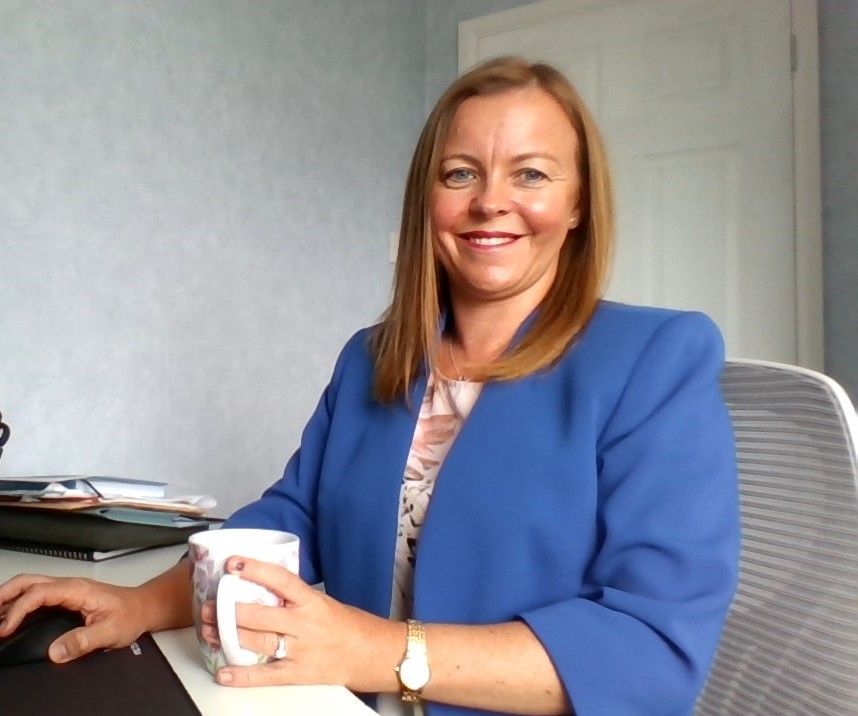
By Helen Robinson
•
18 Oct, 2023
In the hustle and bustle of modern life, parents often find themselves at a crossroads, torn between pursuing personal dreams and dedicating their lives to nurturing the next generation. It's a dilemma that resonates with many; the sacrifice of a thriving career, social life, or even a relaxing Friday night, all in the name of their children. But what if, instead of feeling trapped, we viewed these sacrifices as an embodiment of true freedom? Renowned Japanese psychiatrist and author, Meiko Kamia, introduced a perspective that challenges the conventional notion of freedom. In her profound insights, she emphasised that true freedom isn't just about indulging in personal desires; it's the ability to choose, even when faced with constraints. According to Kamia, our freedom lies in the choices we make, especially when it comes to the significant others in our lives — our children. Her writings would suggest parenthood is a profound expression of this freedom. When parents willingly channel their energy, time, and resources into their children's well-being, they're exercising their power of choice. It's a conscious decision to invest in the future, to nurture young minds, and to shape a better world. In the pursuit of 'Ikigai' — the Japanese concept of finding purpose and value in everyday life — parents discover a unique path. Kamia’s wisdom reminds us that this journey is not restricted by sacrifices; instead, it's enriched by them. Every bedtime story read, every football practice attended, and every sacrifice made on behalf of a child is a testament to the freedom of choice. Parenthood isn't a trap; it's a liberation—a freedom to invest in something far greater than oneself. The sacrifices parents make are not burdens but stepping stones toward a fulfilling life. Through these sacrifices, parents mould compassionate, resilient, and empathetic individuals who will one day contribute meaningfully to society. In the warm embrace of parental love, we find the embodiment of freedom. The freedom to guide, nurture, and witness the blossoming of a new generation. It's a freedom that transcends the constraints of time and energy, resonating with the very essence of what it means to be human — the freedom to choose love, sacrifice, and the betterment of others over personal indulgence. In the intricate dance of parenthood, it’s easy to succumb to the weight of daily challenges. The pressure to balance personal aspirations with the demands of family life can lead to feelings of frustration, annoyance, and even depression. What makes matters more complex is that these negative emotions are often shared, becoming a contagious cloud that hovers over not only our own heads but also those of our partners and fellow parents. However, what if we viewed this cycle of negative emotions through the lens of choice and freedom? What if we recognised that our reactions, too, are a manifestation of our freedom — the freedom to express ourselves openly and honestly? Imagine a scenario where instead of letting negativity fester, we openly acknowledge our feelings and discuss them in the same way we celebrate the sacrifices we make for our children. By recognising that venting frustrations is also a choice, we empower ourselves to channel these emotions in a more positive direction. When we embrace this perspective, our emotional well-being stands to benefit significantly. By openly discussing our challenges, frustrations, and even moments of despair, we not only liberate ourselves from the burden of suppressed emotions but also create an environment where others feel comfortable to do the same. In this shared space of openness, understanding, and empathy, the contagious negativity begins to dissipate, making room for support, encouragement, and even solutions. Indeed, it's food for thought — a nourishing concept that could transform the way we approach our emotional well-being as parents. Instead of getting entangled in the web of negativity, we can actively choose to break free from it. By acknowledging our feelings, discussing them openly, and seeking positive solutions together, we pave the way for a healthier mental and emotional state. So, to all the parents out there who have given up a part of themselves for the well-being of their children, know this: you are not trapped. You are free — free to love, free to sacrifice, and free to shape a future that is brighter and more compassionate because of your choices. Embrace your journey with pride, for in your sacrifices, you have found the true meaning of freedom. The next time you find yourself on the brink of sharing a negative emotion, consider this: your freedom lies not only in the sacrifices you make but also in the way you choose to respond to life's challenges. By transforming frustration into open conversation and annoyance into shared understanding, you contribute not only to your own well-being but also to the well-being of the entire parenting community. Together, let’s break free from the cycle of negativity and embrace the true freedom of choice — the freedom to nurture not only our children but also our own happiness and mental health. If you want to learn more about Ikigai and how ikigai coaching can help you reframe your approach for a more positive and purposeful life then get in touch for a free discovery call.

By Helen Robinson
•
09 Oct, 2023
In the fast-paced, technology-driven world of the West, the pursuit of happiness and longevity often takes a back seat. The Netflix series "Blue Zones" sheds light on the remarkable longevity of people in certain parts of the world, emphasising the significance of Ikigai, a concept deeply rooted in the culture of Okinawa, Japan. While Ikigai cannot prevent death, it can certainly transform the way we live, making our existence more meaningful and fulfilling. In the first episode of the series, we're introduced to the town of Okinawa, where the elderly residents partly attribute their long and healthy lives to embracing their Ikigai. But what exactly is Ikigai? At its core, Ikigai is the Japanese concept of finding purpose and joy in life. It’s the reason you wake up in the morning, the driving force that gives your life meaning. The renowned Austrian neurologist Viktor Frankl once said, "He who has a why to live for can bear with almost any how." Frankl’s words encapsulate the essence of Ikigai. When you have a clear purpose, you're equipped to navigate the challenges of life with resilience and determination. Your Ikigai becomes the compass guiding you through the maze of existence, ensuring you don't feel lost or adrift. So, how can we incorporate the wisdom of Ikigai into our Western lives? Here are some key principles to help you discover your purpose and live a fuller life: Gently exploring your Ikigai · Reflect on the activities that make you lose track of time. These moments of flow often align with your passions. Whether it's painting, writing, teaching, or helping others, identifying your passions can lead you to your Ikigai. · Consider your vocation. This may lie at the intersection of what you love, what you're good at, and what the world needs. It could be a profession, a skill, or a service that fulfils a genuine need in society. · Ask yourself questions that helps you identify the purpose that gives your life a higher meaning. It could be a cause, a belief, or a principle that resonates deeply with you. What drives you to make a positive impact on the world? A google search of Ikigai will often reveal a venn diagram as a tool to find your ikigai but this viral image was actually designed to help one find their purpose by the Spanish astrologer Andrés Zuzunaga. Whilst this diagram is a misconception of Ikigai – the diagram can be a helpful tool to help you think about your purpose in a commercial environment. You can also ask yourself 2 or 3 of the questions to help you find your purpose. It may be that not all 4 questions are relevant. Ikigai isn't a distant goal; it's a way of life. Embrace the present moment, savour the little joys, and appreciate the journey. When you live mindfully, you connect with your Ikigai on a daily basis, enriching your life in profound ways. Incorporating Ikigai into your life isn't just a philosophy; it's a transformative practice. It empowers you to live authentically, with passion and purpose. So, take a moment to reflect on your passions, skills, and the impact you want to make. Your Ikigai is waiting to be discovered, offering you the key to a life filled with meaning, fulfilment, and longevity. Remember, as Viktor Frankl wisely said, having a clear purpose transforms the way you perceive life's challenges. When you live with Ikigai, you're not merely existing; you're thriving, embracing each day as a gift, and creating a legacy of purpose for generations to come. Start your Ikigai journey today and unlock the doors to a fuller, more meaningful life.The body content of your post goes here. To edit this text, click on it and delete this default text and start typing your own or paste your own from a different source.
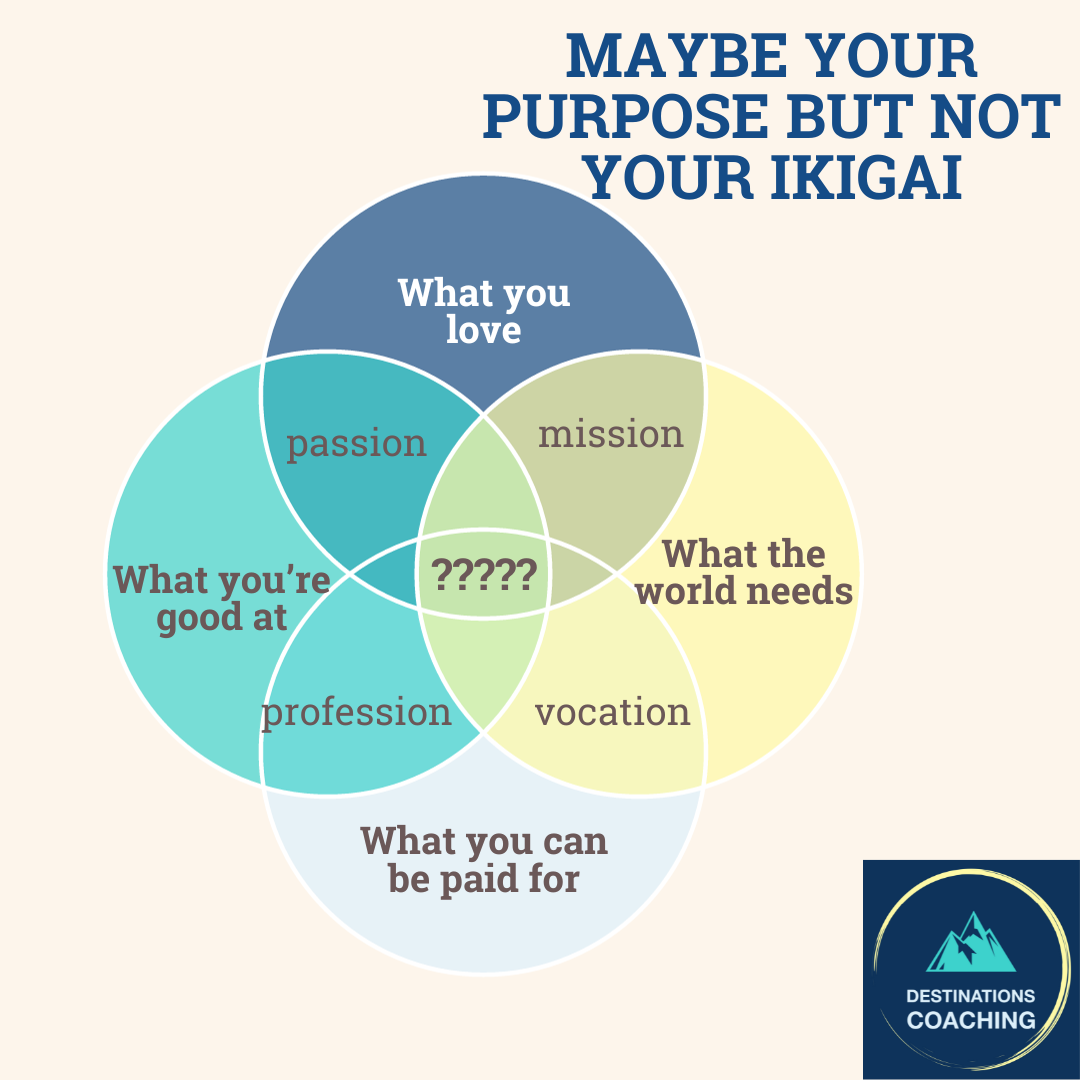
By Helen Robinson
•
03 Oct, 2023
Have you heard of Ikigai? Ikigai: a beautiful Japanese concept that roughly translates to "value in daily living." Some call it the purpose of life, but to the Japanese, it's deeper than that. In Western society, it often gets simplified into the Venn diagram that went viral thanks to Mark Winn from Guernsey, who was inspired by a TED talk on Ikigai. This diagram, akin to finding purpose, gained fame, but the true essence of Ikigai goes far beyond this. My relationship with Ikigai has transformed over the years. Initially confusing, then seen as a quick fix for answers, I've learned to embrace it with calm and patience. Having spent decades in the corporate world, chasing big goals and short term gratification, I was perplexed by Ikigai. It isn't about fitting into a chart; it's about stepping back, reflecting, and finding your 'why' in everyday moments. Ikigai isn't confined to long-term goals; it's a feeling—a sense of satisfaction and acceptance in the present. It's discovered by exploring and converging your passions, values, and social connections. Your Ikigai might be your morning coffee, a walk to the beach, your faith, or even a glass of wine on a Friday evening. It's what makes life feel worthwhile now. In my Ikigai journey, I've found parallels with the enlightenment of Buddhism and the spiritual fulfillment Christians find in God. But there's no judgment on what someone's Ikigai should be. Mine includes my family, my role as a leadership coach, and yes, that Friday evening glass of wine. Ikigai is a fascinating concept, often misunderstood in the UK and Western society. It's a reminder to appreciate life's simple pleasures, connect with what truly matters, and find contentment in the present moment. Have you discovered your Ikigai yet? #Ikigai #PurposeOfLife #EmbraceThePresent
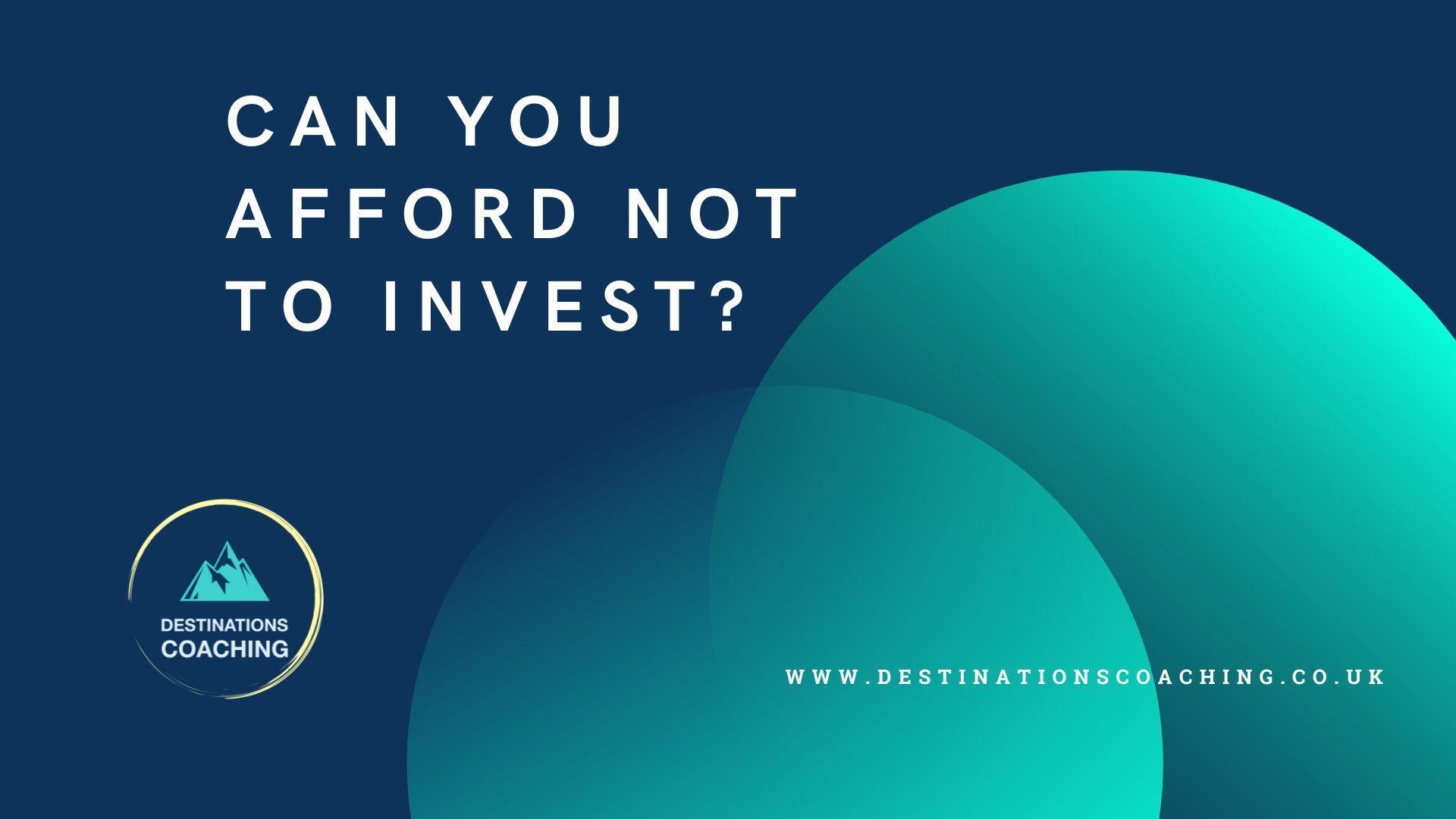
By looka_production_87461723
•
14 Jul, 2023
As the warm sunshine and longer days inspire us to make the most of our time, I wanted to reach out and share something that could potentially enhance your summer experience: life coaching! The coaching I offer is all about empowering individuals to unlock their full potential, overcome obstacles, and achieve personal growth and fulfilment. It's like having a supportive partner who helps you navigate through life's challenges, set meaningful goals, and celebrate your successes along the way. Now, you might be wondering how coaching can specifically benefit you during the summer season. Well, here are a few ways it can make a real difference: Clarity and Goal Setting: Summer often brings a sense of adventure and the desire to make the most of our free time. I can help you gain clarity on what you truly want to achieve during these months and assist you in setting realistic and inspiring goals. Whether it's starting a new hobby, exploring a new career path, or improving your overall well-being, a coach can provide guidance and keep you accountable. Balancing Work and Play: Many of us struggle with finding the right balance between work responsibilities and enjoying our summer activities. I can help you create a schedule that allows you to excel professionally while also ensuring you have time for relaxation, leisure, and spending quality moments with loved ones. I can help you prioritise your tasks, manage your time effectively, and establish healthy boundaries. Personal Growth and Self-Care: Summer is an excellent time to focus on personal growth and self-care. With me, you can explore your values, passions, and strengths, and identify areas where you'd like to grow and improve. I can provide you with tools and strategies to enhance your self-confidence, resilience, and overall well-being. Together, we can create a personalised self-care routine that nurtures your mind, body, and soul. Overcoming Challenges: Life can throw unexpected challenges our way, even during the summer. Whether it's dealing with stress, navigating a difficult transition, or facing a personal setback, I can help offer a fresh perspective, emotional support, and effective problem-solving techniques. I can help you develop resilience and empower you to overcome obstacles with greater ease and confidence. I truly believe that life coaching can be a transformative experience, and I wanted to share this opportunity with you. If you're interested in exploring this further or have any questions, I'd be more than happy to provide additional information and have a free video call to discuss whether this would work for you right now. Remember, summer is a time of growth, joy, and self-discovery. Why not make the most of it by investing in yourself and your personal development? I can help you unlock your full potential and create a summer filled with fulfilment and happiness.
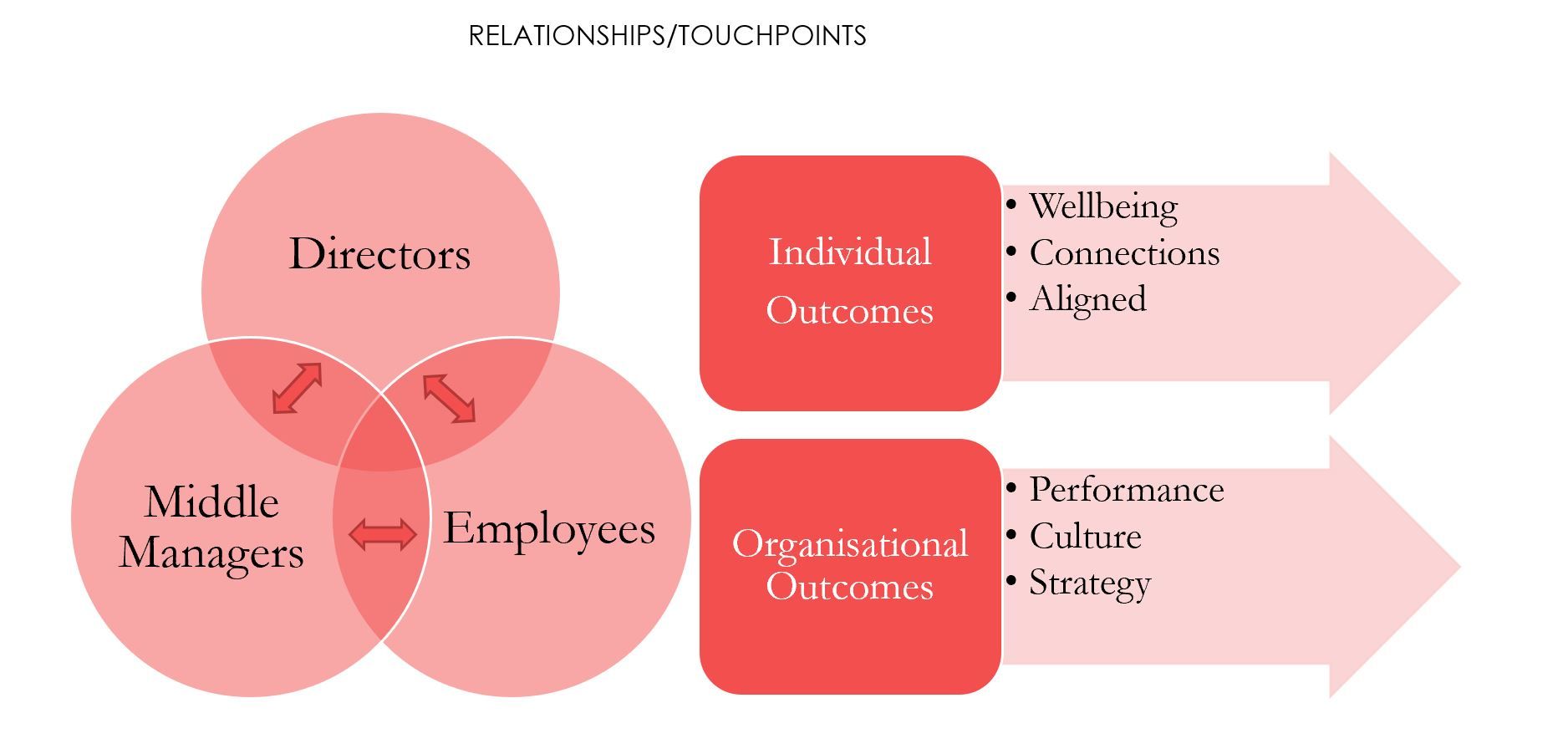
By Helen Wheeler
•
06 Jun, 2023
There is currently a disconnect between the issues reported by Middle Managers and the Board/ Directors. According to a survey by Forbes in February 2023, 46% of middle managers were likely to quit their job within the next 12 months because of work related stress. Organisational strategy has a shorter shelf life than ever before and the traditional management hierarchy isn’t keeping up with the changes. If there is a disconnect between these 2 pivotal points of contact – then the other 4 contact points are unlikely to be aligned. In essence the 3 parties are just floating round in isolation – like 3 balls in a lottery machine – anything can come out of the machine. You may be lucky but its random. 6 Relationships – 6 Touchpoints 1. DIRECTORS – MIDDLE MANAGERS 2. MIDDLE MANAGERS – DIRECTORS 3. DIRECTORS – EMPLOYEES 4. EMPLOYEES – DIRECTORS 5. MIDDLE MANAGERS – EMPLOYEES 6. EMPLOYEES – MIDDLE MANAGERS The middle managers are reporting symptoms – they are becoming victims of the organisation – waiting for an external source to improve their position. In this state internal mentoring is unlikely to be a game changer. The directors are reporting action or lack of action. They are wanting change for their middle managers to come from within -they are not looking to hand it on a plate but are happy to mentor. The mindset and behaviours of middle managers are key to the success of the organisation because everything pivots from them. They are the glue that holds things together, the cogs that make the engine work, the eyes and ears of the board. If this layer of the organisation is not effective and constructive then the productivity and success risks being like a lottery. HOW DOES THE PROGRAMME WORK? Coaching is a non-regulated industry which means anyone can call themselves a coach. As an ACC accredited and qualified coach, I deliver executive coaching adhering to the ethics and values of the International Coach Federation (ICF) – The gold standard of the industry. The middle management solution I provide is a blend of 1-2-1 coaching sessions together with group workshops. This holistic approach coaches the individual manager, and the wider team to unlock the potential and performance of both the individual and the organisation. This approach enables the middle managers to engage with their senior managers and their reportees and jointly transform the wider business. 1-2-1 Coaching Sessions The 1-2-1 coaching sessions are bespoke to the individual coachee. The coach and coachee will partner to set goals at the start of the journey and through a thought-provoking and creative coaching process they will be inspired to maximise their professional potential; unlocking previously untapped sources of imagination, productivity and leadership. Although the coaching is bespoke to the individual, there are 4 common stages coachees work through leading to the magical transformation. 1. Self-acceptance – We explore their feelings, thoughts, beliefs and values allowing them to acknowledge and be comfortable with their authentic self. The coachee may acknowledge that they can’t please everyone all the time and that in their professional life the job itself does not define their identity. Remaining genuine to oneself and to one’s beliefs and values helps with resilience and preventing overwhelm. At this stage coachee’s should have a desire to be themselves in their role. 2. Once a coachee has developed their sense of self-acceptance, we work on their Self-confidence . Confidence comes from the latin word “fidere” meaning trust. Self- confidence is simply trusting in oneself. Trusting in their feelings, their thoughts, their beliefs. Trusting that the questions they ask are valid and that it is ok to have self-compassion. We explore what self-compassion may look like to them and what impacts that may have. I facilitate discussions about work situations related to their goal. E.g Where the coachee is struggling with having too many priorities then we may explore what they have done before to manage this, and what they may do differently going forwards based on their self-acceptance and self-confidence. 3. Realisation – Through exploration and discussion of the issues reported by the coachee -e.g swamped with meetings or caught in the middle the coachee may gain a gentle realisation or a sudden light bulb moment that no-one else is going to swoop down and save them to resolve their issues. We see a mindset change of wanting to identify different things they could do to carve out their own solutions. This may require them to take a different approach – perhaps one not particularly popular, or that falls outside their comfort zone but retaining the focus of their self-acceptance and self-confidence and keeping their initial goals in mind, I ask questions about the art of the possible. 4. The final stage of the coaching process is identifying and practicing Behavioural Change. The personal toolkit they have developed in the first three stages of the coaching process enables them to decide on what they need to do differently going forwards to achieve their goals. Often these new behaviours take the form of forthright diplomacy by having honest conversations with their staff or the directors, showing empathy for others or ways of creating dialogue to improve communication. In any case we keep the original goals in mind and ensure that any actions they take are authentic to them. Group Workshops The second part of the middle management solution takes the form of group workshops. The attendees are likely to be a mix of middle managers, employees and directors. There are several topics to choose from and I can also tailor these to the current position of the organisation. The workshops are underpinned by a coaching ethos. I will not tell attendees what they should or should not be doing or give recommendations but instead as a group we will explore some theories, models or practices related to the chosen topic – e.g. Employee engagement and have lots of discussion and activities to really hone in on their own situation so that they come away with a bespoke plan on what they are going to do that will work for them and their team. During the workshop there are also teambuilding activities that relate to the workshop topic but that also help build, strengthen, or maintain bridges between the different levels of the hierarchy. THE OUTCOMES! The Destinations Coaching Middle Managers Programme empowers middle managers to maximise the areas for which they have control and as the most important layer in the organisational hierarchy enables a controlled but smooth flow between the different layers unlocking the potential for a well-oiled machine. There is a common understanding of the issues middle managers face by both the middle managers and the Directors. Greater self-confidence driven by the acceptance of one’s genuine beliefs and values allows for more constructive and honest discussions including embracing healthy conflict. The middle managers have created their own strategies and toolkits for continuing their professional development. It does not stop when the coaching stops but continues in a sustainable manner. For an initial meeting to discuss how the programme fits in with your current strategy contact me on helen.wheeler@destinationscoaching.co.uk or through our website www.destinationscoaching.co.uk

By Helen Wheeler
•
18 May, 2023
“Does Life coaching really work ?” This question comes up time after time when I tell people what I do – I can’t pretend to practise a magical art of turning your life from a boring, monotonous existence into a veritable unicorn-filled wonderland. But in this article, I aim to explain whether it does actually work, or whether you are just throwing your hard-earned cash at life's problems and hoping they go away while you sip a mimosa? Dive with me into the wonderful world of life coaching and let me know whether you think it's genuinely effective or just another fad with a fancy name. What is a Life Coach, Anyway? First, let's define our terms. What is a life coach? A life coach is a professional dedicated to helping clients achieve growth and goals in various aspects of their lives, such as career, relationships, health, and personal development. Think of us as the high school football coach of your life, pushing you to be the best version of yourself while occasionally yelling motivational quotes at you. Does Life Coaching Actually Work? The Science and Evidence Now that we know what life coaching is, let's look at whether it works or not. According to a survey conducted by the International Coaching Federation (ICF), those who hire a coach can experience a wide range of positive effects in their lives. Let's break down some of the most important findings: · 80% of respondents reported improved self-confidence · 73% said relationships improved · 72% had better communication skills · 67% reported better work-life balance These types of results show that working with a life coach can be a game-changer for those looking to develop their full potential. However, it's important to note that not all life coaches are created equal, and the quality of coaching can vary widely. So before you go hiring the first life coach you find on Instagram, let's discuss some crucial factors you should consider. Choosing the Right Life Coach: Credentials, Experience, and Specialisations As I mentioned earlier, anyone can decide to be a life coach, and the industry isn't regulated. This means you could potentially hire your weird neighbour who never picks up after their dog as your life coach (not recommended). So how can you ensure you're working with a skilled and knowledgeable professional? Here are some tips: Look for Certifications and Experience A good life coach should have some form of certification or training under their belt, preferably from a reputable organisation like the International Coaching Federation (ICF). Additionally, they should have experience working with clients and helping them achieve their goals. Don't be afraid to ask for references or testimonials to ensure you're working with a true professional. Consider Specialisations Life coaches often specialise in specific areas, such as career coaching, relationship coaching, or health and wellness coaching. Make sure to choose a coach who specialises in the areas you need help with to ensure they have the expertise to guide you effectively. The Coaching Process: How It Works and What to Expect Now that we've covered how to find a good life coach, let's explore what the coaching process entails. While the process can vary depending on the coach's background and your specific goals, there are some general steps you can expect: 1. Initial Assessment: Your coach will start by getting to know you and understanding your goals, challenges, and areas you want to improve upon. This might involve completing assessments like the Wheel of Life or discussing your strengths and values. 2. Goal Setting: Once your coach has a clear understanding of your needs, they will help you create specific, measurable, and achievable goals to work towards. 3. Action Planning: Your coach will help you develop a personalised plan to achieve your goals, including the steps needed to get you from where you are now to where you want to be. 4. Ongoing Support: Throughout the coaching process, your coach will provide guidance, motivation, and accountability as you work towards your goals. They will also help you identify and overcome any obstacles you may encounter along the way. 5. Evaluation and Adjustment: As you make progress, your coach will help you evaluate your progress and make any necessary adjustments to your plan. Is Life Coaching Worth the Investment? Weighing the Costs and Benefits Life coaching can be a significant investment. So is it worth the cost? Ultimately, that depends on your individual goals, the quality of coaching you receive, and the value you place on personal growth and development. When weighing the costs and benefits of life coaching, consider the potential return on investment (ROI) in terms of increased happiness, self-confidence, productivity, and overall well-being. If you believe that life coaching can help you achieve your goals and improve your quality of life, then it may be well worth the investment. The Final Verdict: Does Life Coaching Work? The short answer is: it depends. Life coaching can be highly effective for some people, helping them achieve their goals and improve their overall well-being. However, the quality of coaching can vary widely, and it's essential to find a skilled, experienced professional who specialises in the areas you need help with. If you're considering working with a life coach, make sure to do your research, ask for references, and weigh the costs and benefits carefully. And remember, life coaching isn't a magic wand that will instantly transform your life -- it takes time, effort, and commitment on both your part and your coach's part to achieve lasting, meaningful change. So, is life coaching worth it? That's ultimately up to you to decide. But one thing's for sure: if you're looking to level up your life and make some serious progress, having a skilled life coach in your corner can be a powerful ally. Just make sure to choose wisely, and remember: life's too short to settle for anything less than a unicorn-filled wonderland. If any of this is making you curious to know more why not drop me a line – it costs nothing but your time to have a 30 minute discovery call with me.
Site Map

